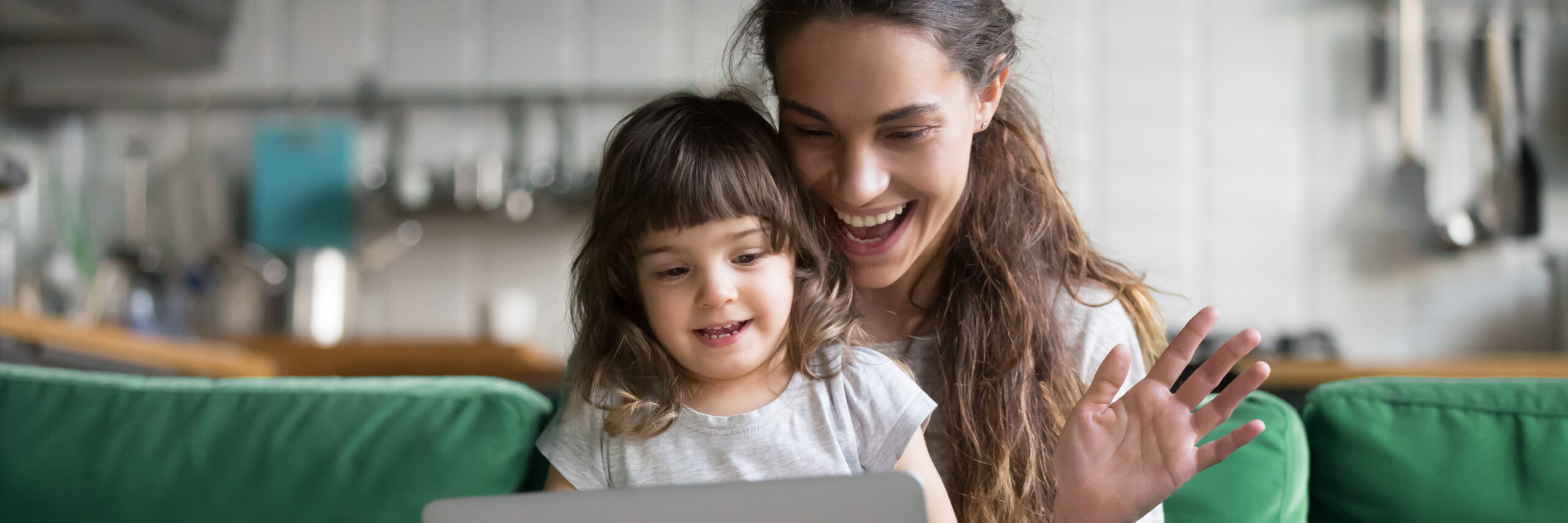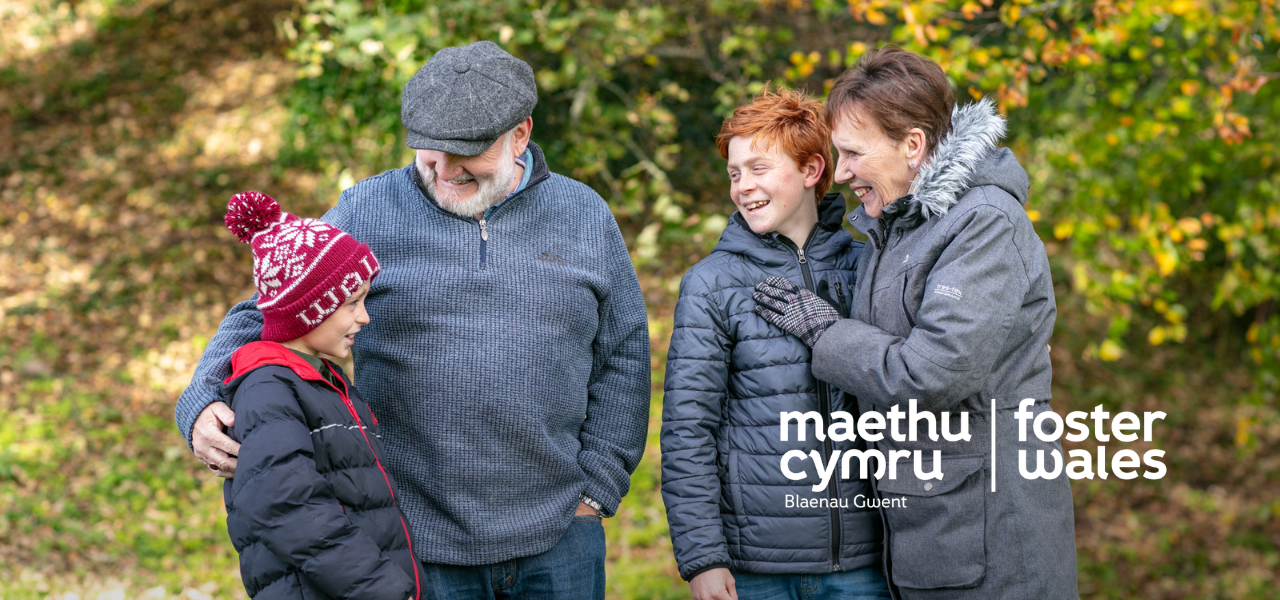
For most, the end of the year is a good moment to reflect and make new plans for the year ahead.
The new year motivates us to act, improve ourselves, and find a new purpose. But you do not need to wait until the new year to make a difference. Maybe you recently retired, or your children have moved out, leaving your house feeling a little empty. Perhaps your work arrangements have recently changed, and now you have more free time or a more flexible schedule.
You may be asking yourself, ‘how can I make a difference in my community?’, ‘how can I become a better person?’ or ‘what can I offer to help others?’
Especially in this difficult time, when the world is struggling with the economic crisis and the consequences of war in Ukraine, most of us feel the need to act and do something good for others.
Becoming a foster carer for vulnerable local children and young people is one of the ways you can make a real difference. Every story of a child who has found safety, warmth and love in foster carers’ homes is a story of success, and you can be part of it.
What do foster carers do?
There are many reasons why children cannot live with their family; it is usually because of problems their parents are experiencing, such as illness, relationship difficulties or substance misuse, or it is because the children have been neglected or abused.
Foster carers can provide a safe place, a fresh start, and a loving family to children without erasing the past. When you become a foster carer with your Local Authority, you help maintain (wherever safe) the bonds that foster children have with their birth families. Children fostered locally can preserve friendships, familiar places and everything that matters to them.
Our priority as Local Authority fostering services is to keep children in their local community if it is the right thing for them. As a local foster carer, you have an important task: to make sure the child feels safe, supported, and happy. Our role is to support you in every way we can.
“I didn’t become a foster carer because you get paid to look after a child. I became a foster carer to make a difference in a way that that child, whether it be a week, or a couple of weeks, months or years, that I’ve made some sort of stamp on their life.”
Stacey, a local foster carer
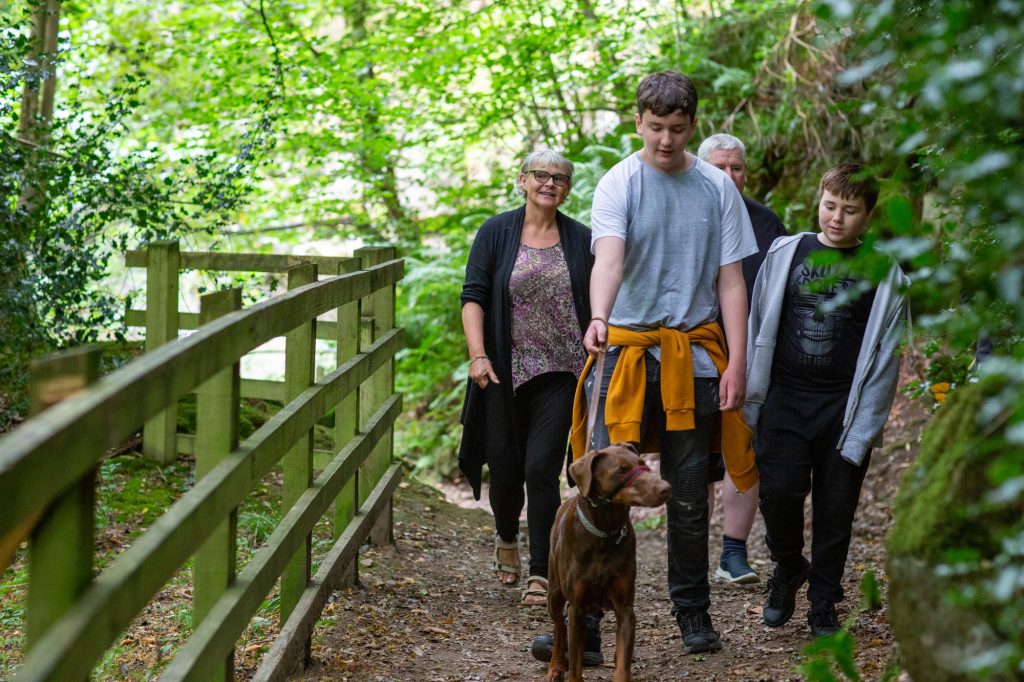
At the core of fostering is a dedication to making a difference in children’s life. Sometimes your home might be a shelter for a child that needs an emergency bed for a night; other times, it can become a safe haven for a longer period – a month, a year or several years. As a foster carer, you accept a child as part of your family and potentially change the course of their life.
Fostering is a commitment to be there for children, to listen to them and be dependable. Your tasks as a foster carer will vary depending on the age of the child you foster. Younger children will need taking to and collecting from school; you will need to organise the family time and entertainment, assist with everything children need at a young age, nurture and teach them.
Older children and teens will need your wisdom, guidance, and support. You will help prepare them for adult life, which can include advising them on their educational path; how to manage money and bills, how to cook and do laundry, how to deal with emotions, and more.
Regardless of their age, your role will be to believe in them and be there for them.
“The impact you can have on a child’s life can be really massive. If you have empathy, can offer safety and a place where a child can thrive, then you should give it a go.”
Hope, a care-experienced young person
Is fostering the same as adoption?
We are asked this question a lot. Foster care and adoption share some common values, like kindness, compassion, and stability, but they are fundamentally different.
Fostering is a safe harbour when it is needed most. You become a carer for a child on a short-term or long-term basis. You are not legally responsible for that child and are not replacing their birth parents in a legal sense. Children looked after remaining the legal responsibility of the Local Authority. As a foster carer, you work with us to create a safe and loving environment for the child, until they can either go back to live with their parents, other family members or become adopted or fostered for the rest of their childhood.
When you adopt a child, you become the legal parent of that child. You have legal responsibility for them; they take your name and are legally a part of your family.
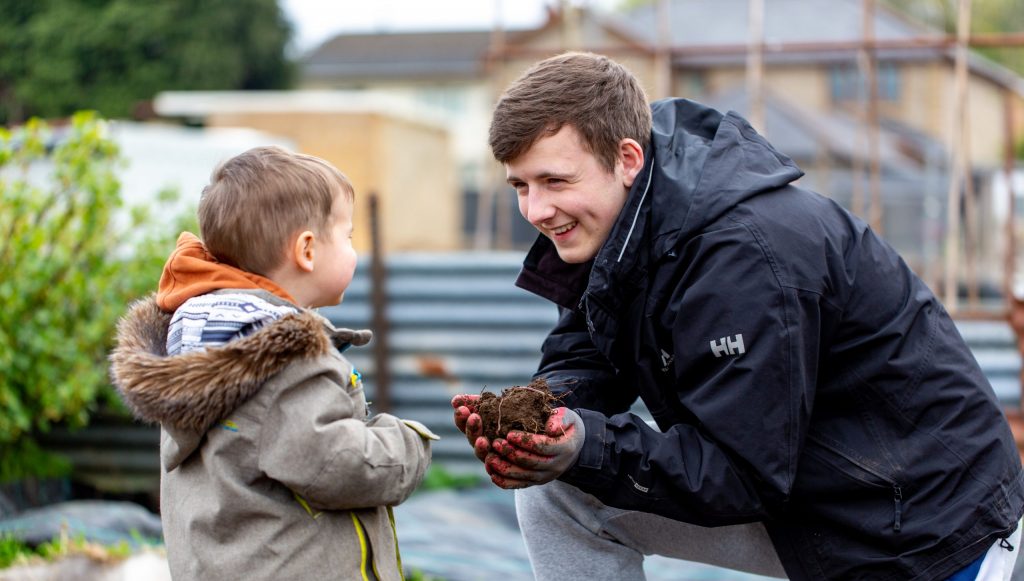
Importance of diversity in fostering
Becoming a foster carer is not something you decide overnight, but there are also many myths and misunderstandings surrounding foster care which don’t help making this decision easier.
A popular belief is that to become a foster carer you need to be married, own a big house, be relatively young, and have previous experience raising children.
The reality is that we need diversity in foster care. We have many children in our care from different ethnicities, races and religions; children with disabilities, babies and teenagers, and children requiring a specialist approach. Year on year, we struggle to find foster carers who match their needs.
So, if you ever thought that you can’t be a foster carer because, for example, you are from a different cultural background or identify as LGBTQ+, we want to dispel the myths and encourage you to consider fostering. Below you can find answers to a few of those frequently asked questions.
Am I too old to foster?
Whether you are in your 40s, 50s or even 60s, you can become a foster carer if you are fit and healthy enough to enjoy the activities children need to develop and grow. If you are active and like to keep busy, younger children will provide you with plenty of activities, but if you’re not able to play ball or run after a toddler, you can still offer a home to an older child or a teenager. Part of the assessment process involves health checks, which will help us determine which type of fostering suits you best. There are different types of fostering, and we will be able to advise you on what would best suit your lifestyle. Our friendly staff will always be there to support you, equipping you for anything that comes your way.
Regardless of your age, you can always offer something valuable; it could be your experience raising your own children, wisdom that comes with your life experience, or simply your maturity and knowledge.
I’m single; can I foster?
It’s a popular myth that to become a foster carer you need to be married or in a relationship. Yes, you need to be able to offer stability and a safe home, but there are no special requirements for relationships. You can be single, a couple, married or in a civil partnership.
If you want to foster as a single person, it is vital to have sufficient emotional and practical support. A family member who can be available (even providing emotional support) or a friend who can offer help from time to time are invaluable.
I have a full-time job; do I have to give it up to foster?
Work life doesn’t have to stop you from becoming a foster carer. It’s about choosing the right type of fostering in your circumstances and making sure that your network can be there to support you.
We have foster carers who are single and own a business, so their schedule is very flexible; we also have foster carers who work full-time, and their jobs are flexible enough to offer support to teenagers (for example, supported lodgings). There are no typical scenarios. Your family set-up and lifestyle are unique, and we will be able to guide you and advise you about the type of fostering to suit your situation. If you want to work and foster, you could start by offering short breaks fostering (also called respite care) and slowly gain experience to potentially progress to fostering full-time. Read more in our guide ‘Can I work and foster‘.
I don’t have children; can I become a foster carer?
You don’t have to have your own children to foster. If you have any relevant experience with children, for example, working as a teacher or babysitting, it can be helpful. However, we don’t expect you to have extensive knowledge, specific qualifications, or experience in raising your own children to foster.
Your desire to offer a nurturing, safe and loving home to a child is what truly matters. When you become a foster carer with your Local Authority, we become your local support network, and provide you with extensive learning and development opportunities. You can also learn about fostering and children’s development from books or films recommended by our foster carers and social care professionals.
If you have more questions, visit our Common Questions page.
The support you receive when you become a foster carer
Fostering needs a team approach. Beyond family, we will help to provide a support unit of social workers, therapists, and teachers so you will receive guidance at every step of your journey.
If you live in Blaenau Gwent, we offer a lot of help, like access to our in-house therapeutic service, and membership to the foster carer association group. You’ll also receive paid membership to The Fostering Network (TFN) and generous financial allowances. For example, you can get a minimum of £543 per week if you foster two young people aged 13 and 16 with Foster Wales Blaenau Gwent. Every Local Authority offers slightly different support and rewards, so it is worth checking with your local Foster Wales team.
Beyond that, our fostering community is ready to welcome you and offer support via meetings, events and online social media groups. They are happy to share their experience and guide you in your fostering journey. Some of our foster carers also offer mentoring and individual peer support.
“I like my LA, they’re good to me. They’ve been brilliant with support; you get to know everybody; the social workers are near if there’s any problem.”
Shirley, a local foster carer
How long does it take to become a foster carer?
Now, knowing a bit more about what it is like to become a foster carer, you’re probably wondering how long the process takes.
The aim is approximately 4-6 months to become a foster carer, and during that time, we do our best to ensure the best possible outcome for you as a new foster carer and the children in our care.
You can see what the process entails in the diagram below:
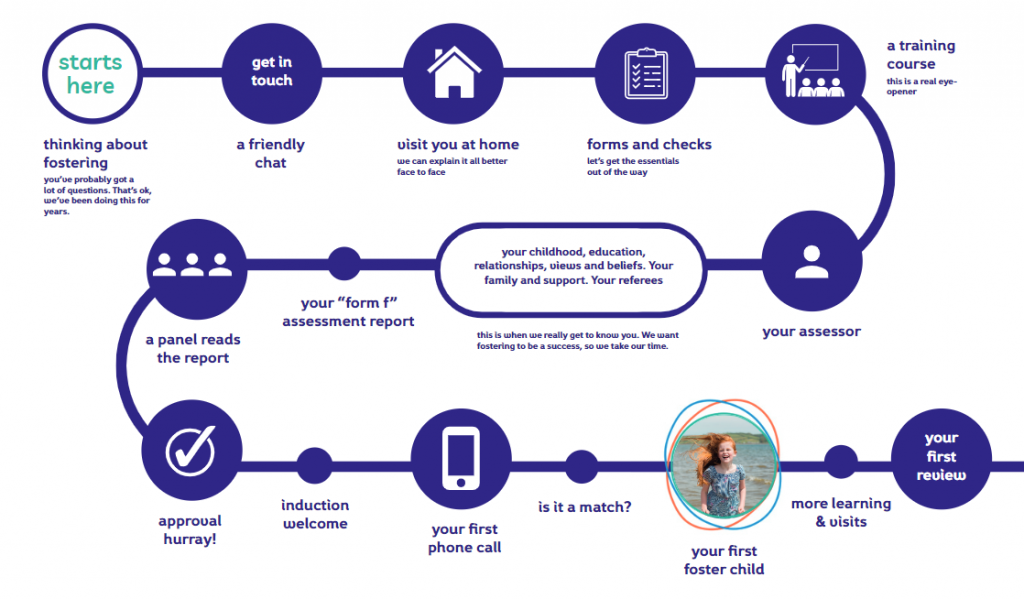
Why does it take this amount of time to become a foster carer?
Fostering is much more than finding a safe bed and a roof over children’s heads. We need to get it right; children deserve our best work, not a rushed job. We’re taking our time to meet you and get to know your family set-up, lifestyle, and beliefs; we aim to build a lasting relationship with you and your family.
During the process, we’re giving you all the information you need; whether you know a lot about fostering or not, we dispel myths and tell you the truth about what it is like to be a foster carer. We want to find out about your motivations; are you determined to accept challenges and the more difficult times that may come with being a foster carer? Are you willing to sacrifice time and dedicate yourself to meeting children’s needs?
Read our blog post on, ‘Why (to do it right) it takes 6 months to become a foster carer?’ if you want to find out more.
Do you think you could make a difference and become a foster carer?
Why not get in touch with your local authority fostering team today? They will provide you with further information and help to guide you through the process.
If you live in Wales, visit the Foster Wales website where you can find all the information and contact your local authority service.
Living in Blaenau Gwent, Wales? Send us a message, and we will get back to you as soon as we can.
Choosing Foster Wales, your Local Authority fostering service, is a decision to work with real people in your community, who care for children, not for profit.
